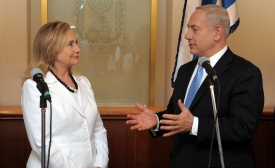syria
With a massive invasion by U.S. ground troops ruled out — for now — the debate in Washington over what to do about Islamic State militants has shifted into the realm of diplomacy and “soft power.”

Philip Seib on what the U.S. is getting wrong in the Middle East.
Building local capacity has increasingly become a vital component of humanitarian and development programming. The problem, however, is when different groups have different definitions and expectations of what it should look like in practice — as in the case of Syria.
This is a means to unify military and humanitarian assistance to the rebels, in order to maximize the soft power of the United States on the Syrian opposition.
Nowhere is the contrast between Benedict XVI and Francis more tangible than in the degree to which the papacy seems to have recovered its diplomatic and geopolitical swagger. The normalization of relations between the U.S. and Cuba in December 2014 came about in part thanks to Francis, who wrote private letters to President Obama and Cuban president Raúl Castro that reportedly helped break the ice between the two leaders.
Since becoming president, Barack Obama has emphasized soft power, suggesting that an over-reliance on military force has alienated many of the United States’ friends and allies without achieving much in return. But many Republicans, and even some Democrats, accuse him of overcorrecting (...). For all their finger-pointing, both parties have, in reality, come to embrace an intermediary approach—what can best be called “energy power.”
Last June, U.N. Secretary-General Ban Ki-moon issued a far-reaching administrative ruling that offered marital benefits for the first time to all of the United Nations’ lesbian and gay employees, as well as to other U.N. workers who had entered legally recognized domestic partnerships. On Monday, March 2, Russia gave the plan a resounding nyet.
After months of negotiations and reviews, Turkey and the U.S. have signed a train-and-equip agreement aimed at bolstering moderate Syrian opposition fighters. This agreement is likely to have diplomatic outcomes between the two NATO allies and provide answers to many questions currently in the air, however, if we analyze the situation objectively, the “train-equip agreement” is going to make very little change in the civil war situation – if any.







